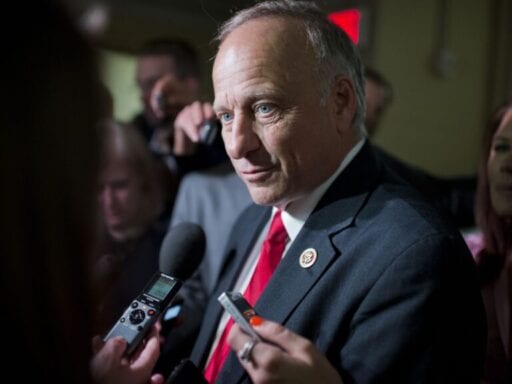If anything, King says the only thing he did wrong was agree to an interview with The New York Times.
Over the last few weeks, Iowa Rep. Steve King has defended white supremacy, been reprimanded by his own party leaders, and been stripped of his committee positions in Congress, yet in his mind, he has done nothing wrong — except agree to an interview with The New York Times.
While opening his first town hall since his racist remarks were published in print — when he told the Times’ Trip Gabriel, “White nationalist, white supremacist, Western civilization — how did that language become offensive?” — King said Saturday that his main regret was sitting down for the phone interview when he was only “half-ready.”
“It is stunning and astonishing to me that four words in a New York Times quote can outweigh 20-some years of public service,” he said to a crowd of roughly 70 people who attended the event in Primghar, Iowa. He remains adamant: “I am not a racist.”
”I’ve made more than one mistake, we all have. I should have never done an interview with The New York Times,” he added.
King’s admission earlier this month was met with widespread condemnation. In response, congressional leaders booted the nine-term Republican from his committee assignments, leaving him with little power in Congress.
But given his reputation for making outrageous comments and history of blatantly racist innuendos, King’s remarks are hardly a surprise. In fact, his past comments have been so outlandish and controversial, it’s hard to believe that he had never been formally punished by his party leaders until now. If anything, he’s been lauded for his tenacity by defenders on the far-right fringe, including President Donald Trump. Vox’s Jane Coaston has a highlight reel of King’s career-defining remarks, like the time “he directly compared the existence of the Congressional Black Caucus to having an abortion.”
Or when he endorsed a white nationalist in Toronto’s mayoral election. Or when he’s taken foreign trips to meet with far-right groups founded by Nazis. Or when he’s espoused his belief that “white nationalist” wasn’t a “derogatory term” until just a few years ago. Or any of myriad examples that are so prevalent and widely known that even the conservative outlets that condemned King for his remarks to the New York Times listed those examples, too.
And yet in 2015, even after King’s comments about DREAMer immigrant kids having “calves the size of cantaloupes” and his decision to bring a far-right Dutch politician who believes that the Quran is “worse than Mein Kampf” to the Capitol, conservatives didn’t feel the need to distance themselves.
King on Saturday dug in his heels even further, going as far as to suggest he’d been treated worse than newly minted Supreme Court Justice Brett Kavanaugh, who underwent a hotly contested vetting process after multiple women accused him of sexual misconduct.
”I even think of Brett Kavanaugh, he went through that inquisition, he at least had accusers, I don’t have accusers even,” he continued. “Not one soul has stood up and said Steve King has acted in a racist fashion.”
King’s surprise is understandable — it’s taken Republicans years to start calling him out
For years has King slid by unchallenged, facing little rebuke or backlash from his constituents or member of his own party, even as his political views toed the line of white nationalism. Too often his comments were written off as merely “controversial” or fringe opinions. And as Coaston writes, we as a society are terrible at talking about racism out of fear of implicating ourselves or problematic ideas that we grew up around.
There’s a larger problem, one far bigger than King, or conservatism. The way we talk about race and racism in the United States is wrong. In short, we think of “racist” as an insult rather than as an adjective. And we have narrowed down the concept of racism to an almost ludicrous extent, in effect often excusing real racism — such as that espoused by people like King — and its impact on nonwhite Americans because it is not literally wearing a hood or setting a cross alight on a lawn.
Only recently have King’s views come back to haunt him — he barely won re-election last November, and already three Republican challengers are primed to claim his seat in 2020.
But King’s town hall event Saturday was also a reminder of his enduring popularity in a congressional district that’s nearly all-white. King’s constituents know his views support white nationalism — many just don’t care. At one point, a questioner stood up in the town hall to defend King, thanking him for all his work supporting “the white, European man.”
Author: Amanda Sakuma
Read More



